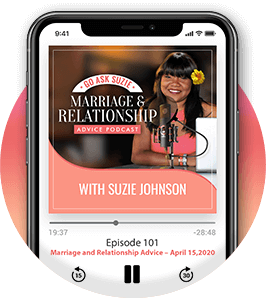![]() Dear Suzie, I had a four-month long inappropriate relationship with a consultant I met at my job. My wife found out and was devastated.
Dear Suzie, I had a four-month long inappropriate relationship with a consultant I met at my job. My wife found out and was devastated.
I never meant for any of this to happen.
I’m desperate for my wife to forgive me, but I don’t know if she will ever get over me lying to her and being with another woman. What can I do to get her to forgive me? I am truly sorry for what I did. I want my marriage back. What do I need to do? – William B.
![]() Dear William, Learning how to inspire someone’s desire to forgive is like learning how to fly fish. It’s a very delicate process that requires both skill and intuition. The mechanics can be taught in a day, but the process might take much longer to master. As with fly fishing, successfully inspiring forgiveness is usually a matter of willingness to learn, the commitment to practice what you’ve learned, and the patience to wait for the right results.
Dear William, Learning how to inspire someone’s desire to forgive is like learning how to fly fish. It’s a very delicate process that requires both skill and intuition. The mechanics can be taught in a day, but the process might take much longer to master. As with fly fishing, successfully inspiring forgiveness is usually a matter of willingness to learn, the commitment to practice what you’ve learned, and the patience to wait for the right results.
Which reminds me of a story…
There once was a son of a powerful king. This prince had inherited all the riches and responsibilities of his father’s land. But he was young, and he wanted none of it. So one day, he coolly said to his father, “Father, my older brother is here. He is wise, dedicated, and loves to rule like you do. Why not give me my inheritance and let me find my own way… in another land?”
The father who was a very wise man shook his head ruefully but said “I understand,” and gave his younger child exactly what he wanted.
When the elder son saw what the father had done, he was raging mad. “Why have you let him go so easily, Father? Don’t you know he has not yet learned good sense? Don’t you know he will squander all the riches from your coffers? Don’t you know he will bring disgrace to our house, our name, and himself? Why have you allowed him to abdicate the responsibilities of his birth?” “Because,” the king replied, “above all, responsibility is a choice.”
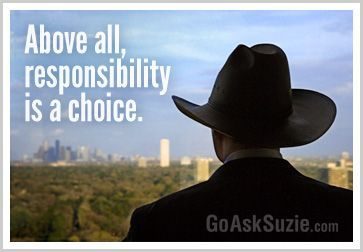
And so the story is told…
The younger son made his way to another city. At first, it was great fun. He had never before tasted such freedom. The money flowed, and the friends followed. But eventually, the money ran out and so did the friends.
The young prince soon grew lonely and scared. What was to have been a great adventure had now become a horrible nightmare.
Soon, this son of royalty found himself joining the homeless, eating at soup kitchens, sleeping in a bus station that smelled like a pigsty. Until one day, it all became too much for him. The young man sat down in a corner and started to cry. Looking around, he thought, “Even the servants in my father’s land live better than I do.” And then he thought… “That’s what I will do… I will pick myself up, dust myself off, and go home. I will throw myself at my father’s feet, beg him for forgiveness, and ask him to make me a servant in his house. At least then, I will live better than this.”
Since he had no money, the prince had to walk all the way back to his father’s kingdom. There were many points along the journey home where he almost turned back, but the thought of living in poverty again reminded him he had nothing to turn back for, and so he kept on going.
Interestingly enough, as he crossed into his father’s land, no one recognized him. His clothes were those of a beggar, his walk was slow, and his head was hung low… like that of a condemned man. When he reached the gates of his father’s house however, a servant recognized him and sent word to his brother, who rushed out to meet him.
Once the elder brother saw the younger’s bedraggled state and recognized that his dark prophecies had come true, he began to chastise him.
“I knew this would happen! You are a worthless and selfish person. Why have you come back here to disgrace the name of our father? Have you not done enough? When you left, his heart was broken into a thousand pieces. Your betrayal brought him down like a blow from a sword, and now you come back to rub salt into his wounds and make him a laughingstock in front of his friends. Why don’t you just turn around and go back to wherever you came from?”
Indeed, the words hurt the younger son. “It’s all true,” he thought to himself. “I have earned great shame. But I’m too tired and I’ve come too far to turn back now.”
So he told his brother…
“I will see my father and throw myself at his feet. I will beg his forgiveness. If he so wills, I will leave. But not until I have told him how truly sorry I really am.”
Hearing the commotion, the old king came out and saw that his youngest son had finally returned. A great joy descended upon his heart like a dove from heaven. He strode forward and hugged his son with great joy and pride. He ordered a warm bath for him and commanded the servants to adorn him with a silken robe and expensive jewels. He called to the bell tower to ring the great bells. He ordered the plumpest calf killed, and immediately declared a national holiday.
Shocked at the warm reception, the younger son looked at his father with tears in his eyes and asked… “WHY, FATHER? Why have you welcomed me with such open arms? Especially after I have let you down, disgraced you, turned my back on you, and squandered your treasures?”
In response, the father lovingly gazed into his son’s eyes and said, “You could not have squandered my treasure because YOU are my treasure.”
Now… I’m sure you’ve heard this story told in many different ways. The reason it has endured and been repeated in many different cultures is because it points to two very important truths:
- Above all, responsibility is a choice.
- With love, all things are possible.
How do these two truths affect you?
When we look at the story as an allegory, how it applies to your situation becomes more clear.
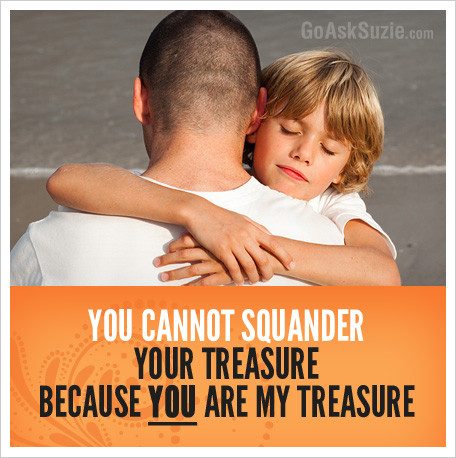
For example, you could easily replace the responsibilities the son inherited with the responsibilities you accepted when you got married (or entered into a committed relationship). You could look at your decision to have an affair as a decision that you no longer wanted those responsibilities (or felt confined, trapped, bored or restricted). You could replace the exotic land with the lure of the other woman, followed by the dawning of recognition that doing wrong didn’t (and couldn’t) make you happy.
We could also look at your desire for forgiveness as your journey back to the responsibilities you had temporarily turned your back on (including your own self-respect and integrity). We could identify the older brother as your own internal critic who whispers to you that you don’t deserve forgiveness, that what you did was unforgivable. The father in the story could be likened to your partner, whose love you hope is strong enough to overlook your immature actions.
But there’s a key in this story that must not be overlooked, and it is this:
At no time did the father go searching for the son. The son’s journey home was self-directed. His desire for forgiveness was sincere. He had learned his lesson. He had seen the contrast between the bird in the hand and the two in the bush. This means he had already created the conditions for his own forgiveness. The father’s loving heart could feel this, and that inspired his willingness to forgive.
Now, think about this son’s future…
Knowing that he had learned that above all, responsibility is a choice (his choice), how likely is he to rebel, resist, or feel overburdened by his responsibilities in the future? If you thought not very likely, then I agree with you.
Therein we find the beauty of this story.
It tells of how we can make mistakes and learn from them. It tells us that by demonstrating that we have truly learned from our mistakes, we automatically create the conditions for forgiveness.
Notice I said we create the conditions for forgiveness, NOT just asking for forgiveness. That’s because the two are completely different.
Here’s what I mean:
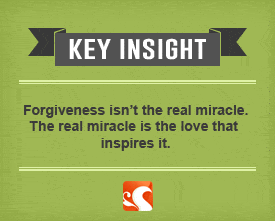
What if the son hadn’t actually felt true remorse? Suppose he had come home feeling entitled or trying to bully, manipulate, or guilt his father into forgiving him. Do you think the outcome would have been the same? Personally, I believe the outcome would have been totally different.
This is because we can only inspire forgiveness through humility and sincerity. The thing to note here is that asking for forgiveness isn’t unique; anyone can do that. However, meeting the conditions by which forgiveness is inspired is a different kettle of fish altogether.
By now, you’re probably wondering… “How do I go about creating the conditions by which forgiveness is inspired?”
Good question. Here’s the answer. In order to create the conditions for inspiring forgiveness, you need to know this:
Key Insight: Forgiveness isn’t the real miracle. The real miracle is the love that inspires it.
Let me explain…
Your partner’s unwillingness (inability) to forgive comes from fear. In other words, it’s not love that causes your partner to hold on to the hurt, feel mistrust, and remain bitter, angry, or vengeful — it’s fear.
Where does that fear come from? It comes from the ego.
What’s the ego?
Here’s the definition I like best of all: the ego is that part of the mind that believes in fear. And that’s the problem with the ego. Fear is its foundation, and therefore, fear is its problem. Now, remember the ego isn’t personal. Everyone has an ego, and everyone’s ego is unforgiving (including your own). When it comes to inspiring forgiveness, the ego’s fear is your greatest obstacle (more on this later).
Now, the question becomes… if fear creates the conditions for unforgiveness, then what creates the conditions for forgiveness? As you probably already figured out… the answer is LOVE. It’s the only power in the universe strong enough to overlook the mistakes of infidelity. That’s why in order to create the conditions that will inspire your partner’s forgiveness, you must first remove the things that trigger their unforgiveness.
The number one secret to inspiring your partner’s forgiveness is to remove the obstacles that block forgiveness.
Sadly… I see many wayward partners doing just the opposite. Rather than creating (and meeting) the conditions for forgiveness, they foster the conditions for unforgiveness. Listen! That does NOT have to be your story. It really doesn’t, because coming up next is a crash course on three of the biggest obstacles blocking your partner’s forgiveness. As you find and remove these obstacles, you automatically create the conditions for your own forgiveness.
Let’s move on…
3 Keys to Inspiring Forgiveness After Infidelity
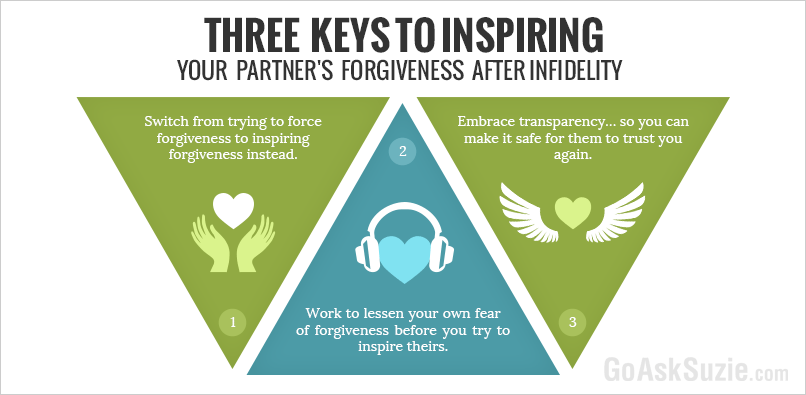
Here are what I consider to be the three biggest obstacles to inspiring your partner’s full and unconditional forgiveness after your affair. I truly believe that as long as any of these obstacles are in your way, your journey back to love, acceptance, and trust will be much more difficult than it has to be. However, by removing these obstacles are the keys you need to help create the conditions needed to inspire your own forgiveness (and theirs).
Forcing Forgiveness Vs. Inspiring Forgiveness
You beg, you cry. You stay up all night talking. You promise. You plead. You try your best to be convincing that this will never happen again. When that doesn’t work, you get angry. You feel frustrated. Just when you think it’s over, the whole thing comes back up again. It’s like trying to kill a vampire, only to have it rise up again and again. It seems like nothing you say or do can ever make the pain and hurt of the affair go away.
You ask yourself… “Why can’t they just forgive me? I’ve told them over and over that it won’t ever happen again. Why won’t they just believe me?”
Welcome to the hamster wheel of trying to force forgiveness. Like a wet paper hammer… it doesn’t work. So, why can’t you simply beg, bargain, plead, or bully your partner into forgiving you? Because true forgiveness has to be inspired, not forced. And there’s a HUGE difference between the two.
Let me explain.
In the groundbreaking book Power vs. Force, Dr. David Hawkins describes two types of approaches to getting what we want in life. We can use power, or we can use force. When we use power, we align with the highest intentions of all concerned. But when we use force, we attempt to impose our personal will on all concerned.
Classic examples of using force to get our way include:
- Guilt
- Emotional blackmail
- Playing the victim card
- Supplication and bargaining
In other words, force is any tactic designed to impose your will on others.
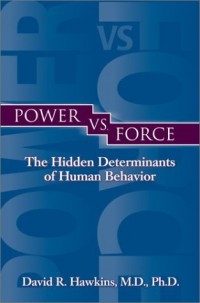
Power, on the other hand, means releasing your personal will to the Highest Good. So, rather than demanding things must be done your way, you say let it be done the best way.
Now, here’s the thing…
There’s a part of the mind (the ego) that’s always fearful that if it doesn’t manipulate, scheme, or use force to get what it wants, then it will lose. But guess what? It’s wrong. Because above all, forgiveness (like Love, trust or responsibility) is a choice. Therefore, true forgiveness must be inspired. It cannot be forced.
My advice?
Choose to switch your focus from trying to force forgiveness to inspiring forgiveness. Ask yourself… “If I want to inspire their forgiveness, what types of actions and emotions do I need to demonstrate right now? Answer this question, and you instantly begin to align with real power and create the conditions that naturally inspire forgiveness.
The Fear Of Forgiveness
The fear of forgiveness is one of the strangest fears people have. And yet, it’s also one of the biggest things that keeps them from being able to forgive other people’s mistakes, as well as accept forgiveness for their own mistakes. So, what’s going on here? I believe the reason so many people can be afraid to forgive can be traced to one single error in judgment: They’ve sided with the wrong team.
Here’s what I mean…
If we strip our feelings down to the core, we discover there are only two sources for all emotions: Fear and Love. (And the two don’t mix.) What comes from fear cannot come from Love, and what comes from Love cannot come from fear. The ego is the part of the mind that’s aligned with fear. That’s why when it comes to forgiveness, the ego is completely against it. Why? Because forgiveness comes from Love, and the ego is afraid of Love.
You should know both betrayed partners and wayward partners fear forgiveness.
For the betrayed partner, fear may look like this:
- Fear of being seen as weak
- Fear of losing face
- Fear it will happen again
- Fear of losing power
- Fear of being made a fool
- Fear of being wrong
For the wayward partner, fear might look like this:
- Fear of not being worthy of forgiveness
- Fear you will be damned if you aren’t forgiven
- Fear you won’t be able to make things right
- Fear you will be haunted by mistakes forever
- Fear you may never live this down
- Fear that forgiveness isn’t going to heal or help
Here’s an important insight:
A fear-filled mind can’t inspire forgiveness any more than the kleptomaniac can inspire trust. This means you can’t come from fear and still hope to truly inspire forgiveness.
Here’s my advice.
Work on lessening your own fear of forgiveness before you attempt to inspire theirs.
How?
Start by asking yourself these questions:
- Do you believe you deserve to be forgiven?
- Do you think you could accept forgiveness should it be offered?
- Are you truly sincere in your desire to be forgiven?
Once you can honestly answer yes to these questions, then begin to work on lessening your partner’s fear of forgiveness.
Ask your partner:
Ask: What is it about forgiving me that frightens you the most?
Find out: What can I do to help minimize those fears?
Listen to me now, and hear the beautiful truth.
To forgive is natural to everyone because Love is natural to us all. Therefore, forgiveness only feels unnatural when fear blocks the way. When you’re able to remove the fear of forgiving, you have removed the real problem. (This is the approach I use in my own forgiveness process). For more help, download and listen to my Wayward Partner’s Complete 7-Step Infidelity Recovery home study program. One of the sessions is called Inspiring Your Partner’s Forgiveness. I’m sure that you will find it very helpful.
Moving on…
The Fear Of Trusting Again
A relationship without trust is like a library without books. It may have the shell, but without the books on the shelves, it has no substance.
What creates trust? Trust is created by predictable choices and consistent loyalty to honesty. Those who are trustworthy are consistent in both words and actions. In other words, trust is the byproduct of honesty.
What creates mistrust? Mistrust is the absence of trust. It’s created by contradictory behaviors, conflicting actions, and inconsistent results. In other words, mistrust is the byproduct of dishonesty. It goes without saying that infidelity is a behavior that creates mistrust. Why? Because it reveals inconsistency, conflicting loyalties, and a willingness to deceive.
This kind of revelation is hard to take.
For the partner who’s been betrayed, it can be especially devastating. Why? Because the ability to trust the one you love is a big part of what makes loving them so special. The discovery of deception instantly shreds that sense of specialness, and that loss of specialness unleashes the kind of emotional pain no one wants to go through again. This is why the fear of trusting becomes such an obstacle for the partner who’s trying to inspire forgiveness, and such a daily battle and constant war for the partner who’s trying to forgive.
If you’re the one that triggered that mistrust in the first place, how can you help minimize the fear?
This is a good question.
My advice?
Embrace transparency.
What is transparency? It’s a way of living without walls. It means you allow your partner to have full access to your inner and outer worlds. This includes access to computers, schedules, phones, emails, etc.
But that’s not all.
Notice that I said… you must embrace transparency. This is because transparency can only restore trust when it’s voluntary. You can’t be forced or guilted into being transparent. It must come from a place of willingness within you.
As you know…
…no one can force you to be honest. No one can make you live with integrity. This is why these traits are so highly prized: Because they can’t be bought, borrowed, bargained, or faked. They must be self-directed.
Here’s another key: Trust is about openness. Infidelity is about secrets. The two can’t co-exist. If you want one, you will have to forego the other. So, if you want to inspire your partner’s forgiveness, you must first find ways to make it safe for them to trust again. The best way to do that? You start by first embracing transparency.
There you have it. The three biggest obstacles to inspiring forgiveness and my advice on how you can remove them.
Final thoughts…
So far, you’ve learned that forgiveness happens naturally when we remove the obstacles that block the way. We covered three of the major ones.
Your mission (should you choose to accept it) is: Begin dismantling these obstacles one by one. By removing the obstacles, you create the conditions by which true forgiveness emerges. I have faith you’ll begin this journey now.
Until we speak again…
Remember… Love Wins!






